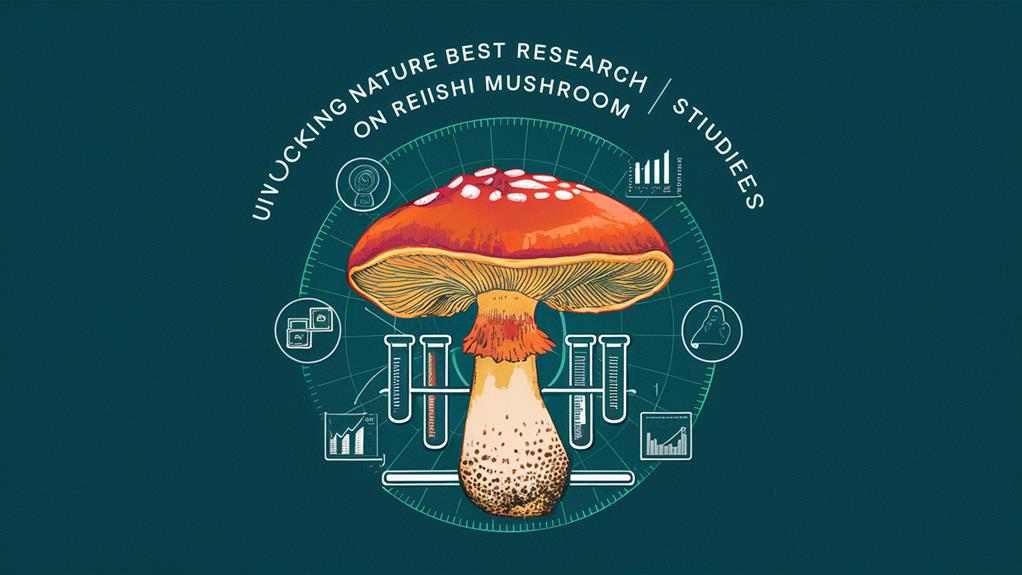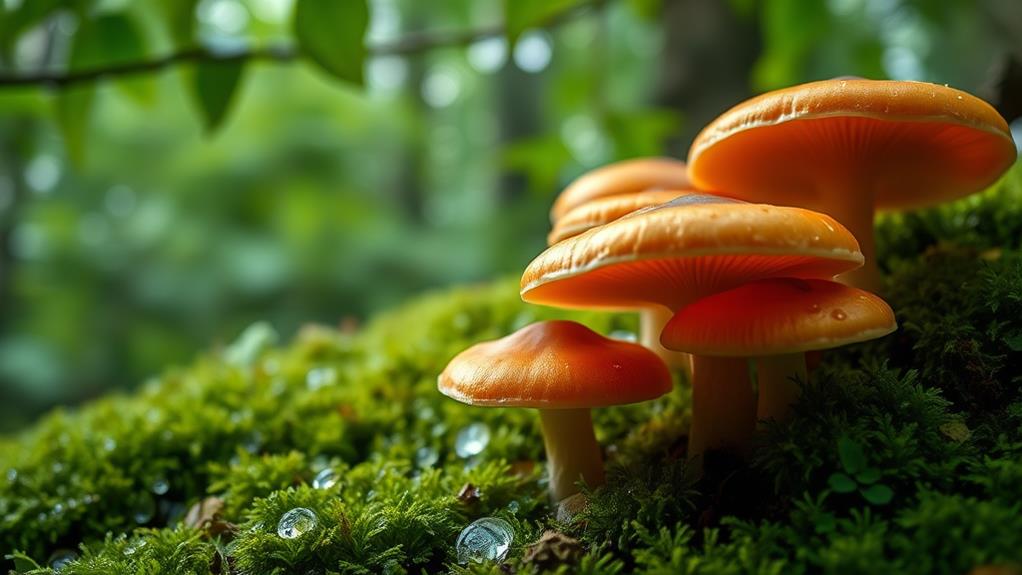
You'll find that research studies on reishi mushroom highlight its diverse health benefits. For instance, studies show reishi enhances the immune system by boosting white blood cell counts, which can help fight cancer. It also has potential anti-cancer properties, promoting cancer cell death and improving the quality of life for patients. Additionally, reishi may reduce anxiety and fatigue, improving mental health. Cardiovascular health studies reveal it can lower blood pressure and improve cholesterol levels. With its strong antioxidant activity, reishi combats oxidative stress. Each study offers unique insights, and there's much more to explore on this fascinating subject.
Historical Significance of Reishi

The historical significance of reishi mushroom, or Ganoderma lucidum, is deeply rooted in its long-standing use in traditional Chinese medicine, where it's been celebrated for over 2,000 years as a potent health tonic and symbol of longevity.
Ancient texts like the "Shen Nong Ben Cao Jing" highlight its remarkable medicinal properties, emphasizing how reishi enhances vital energy and promotes overall well-being. Reishi mushrooms, revered as the "Mushroom of Immortality," have also been linked to health benefits and vitality, reinforcing their esteemed status in various Asian cultures.
In ancient China, wild reishi was a rare treasure, often only accessible to nobility, which contributed to its esteemed reputation as the "mushroom of immortality." This exclusivity fueled its allure and further established its cultural significance.
Reishi wasn't just a remedy; it became intertwined with spiritual practices and the quest for health and longevity across various Asian regions.
The first scientific description of reishi came in 1831 from mycologist Carlo Vittadini, marking an important moment in modern mycology. This shift allowed for a deeper understanding of reishi's benefits, yet its roots in traditional Chinese medicine remain vital.
Today, as you explore reishi, you connect with a rich history that celebrates health and longevity, showing just how significant this mushroom truly is in both culture and medicine.
Immune System Enhancement Studies
Reishi mushrooms have gained attention not just for their historical significance, but also for their potential to enhance immune function. Studies on Ganoderma lucidum, the scientific name for reishi, reveal numerous beneficial effects on the immune system. For instance, a 2006 study showed that colorectal cancer patients who took reishi mushroom supplements experienced an increase in white blood cell count. This suggests that reishi may boost immune responses during treatment.
Additionally, reishi mushrooms contain polysaccharides and beta-glucans that stimulate natural killer (NK) cells and T lymphocytes, further supporting immune health.
Furthermore, research published in "Cancer Immunology, Immunotherapy" found that polysaccharides from reishi mushrooms could stimulate T lymphocyte proliferation and enhance cytokine production, both crucial for strong immune responses. In a clinical trial involving breast cancer patients, reishi use was linked to reduced fatigue and improved quality of life, likely due to its immunomodulatory properties.
Moreover, a study demonstrated that reishi extracts increased natural killer (NK) cell activity in mice, which is vital for fighting infections and tumors.
Lastly, research in "The Journal of Alternative and Complementary Medicine" indicated that reishi supplementation improved immune responses in postoperative cancer patients, showcasing its potential role in supporting recovery and overall immune health.
Anti-Cancer Research Findings

When it comes to cancer research, reishi mushrooms show promising effects that could help patients. Studies suggest that these mushrooms not only promote cancer cell death but also boost the immune system, which can lead to better treatment outcomes.
Research indicates that polysaccharides, particularly beta-glucans found in reishi, enhance immune response against cancer, offering therapeutic properties that are particularly significant.
Furthermore, they may improve the quality of life for those undergoing cancer therapy by reducing fatigue, making this mushroom a fascinating area of study.
Cancer Cell Apoptosis
Inducing apoptosis in cancer cells has become a focal point of research, and reishi mushroom extracts are showing promising results in this area. The reishi mushroom, or Ganoderma lucidum, has been studied for its ability to trigger cancer cell apoptosis through various mechanisms.
Here's what you should know:
- Triterpenoids from reishi have been found to significantly inhibit human breast cancer cell growth and induce cell cycle arrest.
- Polysaccharides from this mushroom can enhance ovarian cancer cells' sensitivity to cisplatin, suggesting a potential boost in treatment effectiveness.
- Research shows that reishi extracts inhibit tumor invasion by down-regulating matrix metalloproteinases, which are important in cancer spread.
- Clinical trials indicate that reishi supplementation may improve the quality of life and immune responses in cancer patients undergoing conventional therapies.
While these findings are encouraging, the specific effects of reishi on cancer cell apoptosis require more investigation.
Nevertheless, incorporating reishi mushroom extracts into your health regimen could be a beneficial step toward supporting your body in the fight against cancer.
Immune System Enhancement
Boosting your immune system can play a crucial role in your body's ability to combat cancer, and research on reishi mushroom extracts suggests significant benefits in this area. The reishi mushroom, also known as Ganoderma, contains polysaccharides that may enhance the activity of white blood cells. These cells are essential for defending your body against cancer.
In a 2006 study, colorectal cancer patients who took reishi mushroom supplements saw an increase in their white blood cell counts. This finding indicates that reishi could help enhance your immune system during cancer treatment.
Additionally, research shows that using reishi extract alongside conventional therapies may improve immune function and reduce fatigue in breast cancer patients.
In vitro studies also reveal that reishi extracts can induce apoptosis, or cell death, in cancer cells, particularly in prostate and colorectal cancers. This highlights its potential therapeutic properties linked to immune system modulation.
Furthermore, animal studies suggest that reishi may protect against lymphocyte suppression, which is vital for maintaining immune function during cancer therapies.
Quality of Life Improvement
Reishi mushrooms not only enhance immune function but also contribute significantly to improving the quality of life for cancer patients. Research shows that these powerful fungi can help reduce fatigue and boost overall well-being during treatment.
Here's how Reishi mushroom benefits cancer patients:
- It enhances immune function, helping your body fight off illness.
- It decreases anxiety and fatigue, leading to a more positive outlook.
- The polysaccharides found in Reishi may improve treatment outcomes, especially during chemotherapy.
- It promotes better sleep quality and emotional well-being.
In a systematic review, cancer patients who used Reishi reported noticeable improvements in their quality of life.
A pilot study involving breast cancer patients found that those who took Reishi experienced significant drops in anxiety and fatigue compared to those who didn't.
Moreover, patients with colorectal cancer showed increased white blood cell counts, indicating better resilience during treatment.
All these factors suggest that Reishi mushroom can play a vital role in holistic cancer care, helping you feel more empowered and supported through your journey.
Embracing Reishi could be a step toward enhancing your quality of life amid challenges.
Effects on Mental Health
When it comes to mental health, reishi mushroom shows some promising benefits.
Studies suggest it might help reduce anxiety, alleviate fatigue, and even improve cognitive function.
If you're looking for natural ways to support your mental well-being, reishi could be worth considering.
Anxiety Reduction Potential
Research into the anxiety reduction potential of reishi mushroom has gained traction in recent years, particularly for its effects on mental health. Studies reveal that reishi may offer anti-anxiety effects, making it a promising option for those dealing with stress.
Here are some key findings:
- A pilot study showed significant anxiety reduction in breast cancer patients undergoing treatment.
- A randomized controlled trial indicated that participants taking reishi supplements reported lower anxiety scores than those on a placebo.
- Research points to reishi's ability to modulate neurotransmitter activity, which might help improve overall well-being.
- In a study on neurasthenia, participants experienced notable reductions in both anxiety and fatigue levels.
While these findings are encouraging, ongoing research is necessary to confirm reishi's effectiveness for anxiety reduction in healthy individuals.
As you explore options for improving your mental health, consider how incorporating reishi mushroom into your routine might help you find relief from anxiety.
With its potential therapeutic role and a growing body of evidence, reishi could be a valuable ally in your journey toward better mental wellness.
Fatigue Alleviation Benefits
Fatigue can significantly impact your mental health, leaving you feeling drained and overwhelmed. Research studies on reishi mushroom show promising mental health benefits, particularly in alleviating fatigue.
For instance, a pilot study found that reishi spore powder might help reduce fatigue and anxiety in breast cancer patients, enhancing their overall quality of life.
In another randomized controlled trial, participants with neurasthenia—a condition marked by persistent fatigue—experienced lower fatigue levels after taking reishi extract. These findings suggest that reishi may not only lessen fatigue but also boost emotional resilience, especially for those grappling with chronic stress.
Moreover, studies indicate that reishi can enhance mental clarity and reduce stress, leading to an improved mood and psychological well-being.
As more research unfolds, the potential of reishi mushroom to promote mental health benefits becomes increasingly evident. If you're struggling with fatigue, exploring reishi as a natural supplement could be a beneficial step toward reclaiming your energy and enhancing your overall mental health.
Cognitive Improvement Evidence
How can reishi mushrooms enhance cognitive function and mental health? Research shows that reishi mushrooms might be a great ally when it comes to boosting your brainpower and emotional well-being. Various studies suggest that compounds found in these mushrooms can stimulate neurotransmitter activity, which is essential for cognitive improvements.
Here are some key findings about reishi mushrooms:
- A pilot study indicated that reishi spore powder may improve memory and reduce anxiety symptoms in Alzheimer's patients.
- In breast cancer patients, reishi has shown potential to alleviate fatigue and anxiety symptoms, enhancing mental health.
- Studies on neurasthenia patients reported significant reductions in fatigue and anxiety levels thanks to reishi.
- Ongoing research explores how reishi extracts could reduce stress and improve quality of life for those with chronic stress-related disorders.
Incorporating reishi mushrooms into your routine may support cognitive function and mental health. Their effects on anxiety symptoms and overall well-being could lead to a better quality of life.
Consider exploring this natural option for your mental wellness journey!
Cardiovascular Health Investigations

Recent studies have shown that Ganoderma lucidum, commonly known as reishi mushroom, may offer significant benefits for cardiovascular health. Research indicates that this powerful mushroom can help lower blood pressure and improve lipid profiles, making it a promising option for those concerned about heart health. In a randomized placebo-controlled trial by Klupp et al. (2016), participants experienced noticeable improvements in these areas.
Furthermore, Chu et al. (2012) highlighted the cardioprotective effects of Ganoderma lucidum, noting its role in enhancing heart function and reducing oxidative stress markers. The mushroom's bioactive compounds are key players in these benefits.
For instance, Wang et al. (2018) found that polysaccharides from reishi exhibited significant anti-inflammatory properties, which can help protect against chronic inflammation, a risk factor for cardiovascular issues.
Additionally, Li et al. (2015) discovered that Ganoderma lucidum extract improved endothelial function and reduced arterial stiffness, suggesting it positively impacts vascular health.
Importantly, Pillai et al. (2011) pointed out that the mushroom enhances nitric oxide production, promoting vasodilation and better blood flow. Together, these findings paint a promising picture for reishi's role in supporting cardiovascular health.
Blood Sugar Regulation Studies
Blood sugar regulation is a crucial aspect of managing diabetes, and reishi mushroom has emerged as a potential ally in this area. Research has shown that this remarkable fungus, known scientifically as Ganoderma lucidum, may help improve insulin sensitivity and glycemic control.
Here are some key findings from various studies:
- A study in 2016 found that reishi mushroom extracts significantly lowered fasting blood sugar levels in diabetic rats.
- Polysaccharides derived from reishi may enhance glucose metabolism, especially in diabetes models.
- A clinical trial revealed that daily consumption of reishi mushroom supplements led to a notable reduction in hemoglobin A1c levels over 12 weeks.
- A meta-analysis indicated that triterpenoids in reishi may support pancreatic health and help modulate glucose uptake.
While many studies suggest positive effects, it's important to note that some trials have shown mixed results.
For instance, one study found no significant effect on blood sugar levels or hemoglobin A1c in non-diabetic individuals.
Antioxidant Activity Research

Reishi mushroom stands out as a potent source of antioxidants, playing a crucial role in combating oxidative stress. Research studies reveal that its polysaccharides and triterpenoids effectively scavenge free radicals, which can otherwise lead to cellular damage.
One notable study published in "Food Chemistry" even found that extracts from Ganoderma lucidum showed higher antioxidant capacity than many common fruits and vegetables.
You'll be interested to know that these extracts enhance the activity of important antioxidant enzymes, like superoxide dismutase (SOD) and catalase, helping to boost your body's defenses.
Additionally, in vitro studies demonstrate that reishi extracts can reduce lipid peroxidation, a harmful process associated with chronic diseases linked to oxidative stress.
The bioactive compounds in reishi mushrooms, particularly polysaccharides and triterpenoids, play a significant part in these antioxidant effects.
They've been shown to mitigate oxidative damage in various animal models, suggesting that incorporating reishi into your diet could be a smart choice for overall health.
With such promising findings, reishi emerges as a powerful ally in the fight against oxidative stress and its damaging consequences.
Safety and Side Effects
When considering Reishi mushroom, it's important to be aware of its potential side effects.
While many find it safe, some people report dizziness, dry mouth, or even gastrointestinal discomfort.
If you're taking certain medications, like anticoagulants, you should consult a healthcare provider to discuss any risks before starting supplementation.
Common Side Effects
Often considered safe for most people, the reishi mushroom can still cause mild side effects for some users. While many enjoy its benefits, you should be aware of potential reactions, especially if you're taking medications like blood thinners or immunosuppressants.
Here are some common side effects to keep in mind:
- Gastrointestinal discomfort: Nausea and diarrhea can occur, particularly with long-term use.
- Allergic reactions: Some sensitive individuals may experience rashes or other allergic responses.
- Insomnia: A few users report trouble sleeping, so monitor how your body reacts.
- Hepatotoxicity: Rarely, certain reishi formulations have been linked to severe liver injury.
Risk Factors and Precautions
While many people enjoy the benefits of reishi mushroom, it's important to recognize the risk factors and precautions associated with its use. Although reishi is generally safe for most individuals, some might experience mild side effects like dizziness, dry mouth, or gastrointestinal discomfort, especially with long-term use.
Keep an eye out for allergic reactions, as they can occur in sensitive individuals. If you're on anticoagulants or immunosuppressants, you should be particularly cautious. Reishi can increase bleeding risk and enhance the effects of these medications, which could lead to serious complications.
Additionally, some case studies have linked specific reishi formulations to severe liver problems, making it crucial to consider product quality when choosing supplements. The safety of reishi during pregnancy or breastfeeding is still uncertain, so consulting your healthcare provider before using it in these situations is wise.
Dosage and Efficacy Trials

Understanding the right dosage of reishi mushroom is crucial for maximizing its health benefits. Research shows that different dosages can lead to various effects, especially when it comes to boosting immune function.
Here are some key findings from clinical trials:
- Participants taking 1.5 to 9 grams daily experienced enhanced immune function, particularly in cancer patients.
- A controlled trial revealed that 6 grams daily significantly reduced fatigue levels compared to a placebo.
- In a study on blood sugar levels, 3 grams daily didn't show significant changes, indicating more research is needed.
- Breast cancer patients taking 1.5 grams daily reported improved anxiety and fatigue symptoms.
These studies highlight the importance of dosage in evaluating the efficacy of reishi mushroom.
While some dosages, like 4.5 grams, showed cognitive improvements, others, like 3 grams, didn't affect blood sugar levels.
As you consider incorporating reishi into your routine, remember that the right dosage can vary based on individual needs and health conditions.
Always consult a healthcare professional for personalized advice, especially if you're undergoing treatment or have existing health concerns.
Future Research Directions
As the interest in reishi mushroom continues to grow, researchers are eager to explore its full potential. Future research directions should prioritize rigorous clinical trials to clarify reishi's immunomodulatory properties and its anti-cancer effects. Current studies offer mixed results, so more cohesive methodologies are crucial.
Additionally, understanding the biologically active compounds, like polysaccharides and triterpenoids, can reveal their therapeutic potential in managing chronic diseases.
It's also vital to investigate the long-term safety of reishi consumption, especially regarding hepatotoxicity and possible medication interactions. These factors could significantly affect how you safely integrate reishi into your health regimen.
Moreover, ongoing studies should delve into reishi's impact on mental health. Preliminary research hints at its ability to alleviate symptoms of anxiety and chronic fatigue, which could be a game-changer for many.
Lastly, exploring optimal cultivation conditions and effective extraction methods can help maximize the bioactive compound content in reishi products. This ensures you get consistent and potent benefits.
Conclusion
In summary, the research on reishi mushrooms reveals their potential to enhance immunity, fight cancer, and support mental health. While studies show promising benefits, it's crucial to approach them like a treasure map—full of hints but not always straightforward. As science continues to explore these fascinating fungi, you can stay informed about their effects and safety. With more research on the horizon, reishi might just be the key to unlocking better health for everyone.
